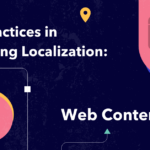
It’s been a wild ride for fintech companies: 2021 was booming — with investment more than doubling from 2020 — as people went online to escape the world outside. Then came the 2022 crash, which forced several fintech businesses to slash their headcounts by up to 18%. So, the question on many lips: What will 2023 bring for the financial sector and fintech services in particular?
Here, we’ve sourced musings from fintech experts and financial services industry gurus to get a sense of how 2023 might play out, and considered how language might impact these upcoming trends. Companies that assess their language operations early may find themselves striding ahead in the coming months.
1. Increased banking in underdeveloped countries
Several sources suggest that 2023 may bring an increase in banking in underdeveloped countries. In 2022, there’s been a growing trend of people using mobile banking apps and other digital banking services in these markets. As more people in these regions gain access to smartphones and the internet, this trend is only expected to climb.
In developing African and South American markets, where traditional banks have been unwilling or unable to provide banking services, online banking platforms could provide financial inclusion — helping small business owners and entrepreneurs to manage their money.
With this expanding market comes a growing need for multilingual customer support and marketing. But how will these burgeoning online banking services market themselves without speaking their audience’s preferred language? New customers often need the most customer support, and customer acquisition can often cost up to 5 times more than customer retention. With a boom in small business and personal finance customers, can these firms offer multilingual support to help these new customers open bank accounts?
2. More and more embedded financial services
Embedded financial services — any financial product offered by a non-financial institution — will continue to rise in 2023. Top of the trend list in 2022, buy now pay later (BNPL) has been taking the market by storm and should remain trending. In fact, this Christmas looks like it will be paid for with next year’s chocolate coins: According to ECOMMPAY research, 33% of shoppers would remove items from their online cart if a BNPL option is not offered.
Other growing embedded financial services include loans, payment processing, insurance, and personal and business credit cards. These services are already integrated into many day-to-day platforms and habits — from in-app payments by Apple, Google, and Amazon to BNPL from Afterpay and Zip.
Many parents will know these services and the problems they can cause — allowing children and teens to make in-game purchases of their favorite skins on their apps, without the need for parental sign-off.
The trend for embedded financial services offered by non-financial institutions is fueled by traditional financial institutions losing their monopoly. They now compete in a wider market against big tech providers and retail companies for a slice of the action.
In such an active market, how can businesses stay ahead? Unbabel’s Multilingual CX Report unveiled that 73% of customers were likely or very likely to switch to another brand if it marketed to them in their native language. What use are fintech products, new technologies, and fintech innovations if you can’t figure out how to use them because of the language barriers? 44% of Unbabel’s Multilingual CX Report respondents said it is easier for them to understand content if a brand promotes and supports its product or services in their native language, while 48% said it makes it easier for them to buy.
3. An uptick in Artificial Intelligence
Artificial Intelligence (AI) has been steadily gaining popularity in banking: Financial Institutions have been using it to solve increasingly complex challenges, and Intergiro notes that AI will continue to mold infrastructure development in the fintech sector. It seems that businesses that don’t automate and adopt AI will get left behind.
McKinsey Global Institute predicts AI could add $13 trillion to the global economy by 2030, or about 16% higher cumulative GDP compared with today.
Since 2017, online searches for ‘AI in banking’ have increased by 104% globally, and Google returns over 661 million articles. Across this trend, many financial services firms have implemented AI in risk management or revenue generation — but why should it stop there?
Intergiro predicts that as conversational AIs become more sophisticated, it may soon be the future of customer service in the fintech industry. Indeed, a study by Juniper Research suggests that banking chatbot interactions will grow 3,150% by 2023, saving banks $7.3bn and 4 minutes per inquiry.
But what makes these interactions successful? Solving the customer’s query, of course, and the fintech industry can only do this if it’s speaking the customer’s language. Translating these chatbot interactions is key. Often, they need frequent updating to stay on top of the latest fintech innovations. It can be pricey to keep updating the translated text from scratch, but using AI and machine translation can help businesses keep their text relevant without extra cost.
Sometimes, the customer query can’t be completely solved via chatbot, and a customer support agent will need to step in. It can be costly and time-consuming to hire and train native-speaking customer support agents to break down these language barriers.
If fintech companies are already using AI for chatbots, why not incorporate an AI+human solution for language? Language solution platforms can be integrated with the business’ CRMs to provide a one-stop solution for multilingual customer service — agents don’t need to switch between their CRM and translation tool, it’s all within the same workflow to streamline conversations. It also allows fintech companies to hire agents for expertise and know-how, rather than language, helping provide the best customer experience.
4. Heightened and tightened customer demands
Customers increasingly know what they want, and their demands aren’t falling on deaf ears. Fintech companies that want to compete need to listen and deliver:
-
Time is money: Contactless, frictionless, and faster digital payment solutions are in hot demand. Especially with millennials and Gen Z, who want financial products that won’t waste their time. Fintech innovations such as BNPL are delivering and are set to stay. With the demand on time, customers also want quick resolutions to their issues. Stumbling through language translation shouldn’t hold customers or fintech services back: Adopting a fail-safe language solutions platform helps get global customers back on their feet and swiping their cards quicker.
-
Secure the vault: It almost goes without saying that banking needs to be secure, whether that’s traditional financial services with four walls or online banking via fintech. Increasing cybercrime and fraud rates are bound to make any customers concerned. Tight security is key, and businesses need to take steps to share their cybersecurity and, in turn, what customers can do to improve their data protection. It’s scary and stressful enough to be scammed, and language barriers that prevent someone from obtaining assistance only make matters worse. Cybercrime customer care needs to help global customers in their preferred language at their time of need.
-
Just for me: People want customized financial technology — from flexible integration with other products to solutions tailored to the end-user. Language is a big element of customization: 26% of respondents to Unbabel’s Multilingual CX Report felt a brand was more relevant to them if it promoted and supported its product or services in their native language.
An explosion of trends
The list doesn’t end there: 2023 looks set to be an explosion of new and growing trends in the world of finance, including more open crowdfunding options — with places like Kickstarter being vital for everything from fintech startups to flourishing retail brands — decentralized blockchain technology solutions, more cryptocurrency exchanges — where multilingual customer support plays a pivotal role in adoption — and an environmental push from the banking industry.
Fintech can revolutionize the way people open their wallets and interact with money, but to truly make a global impact, the fintech industry — including brands such as ​​Mollie, Klarna, and Revolut — needs to enable language operations throughout their customer experience.
Learn how Unbabel can help Fintech fall into formation for 2023 — whatever it may bring.













